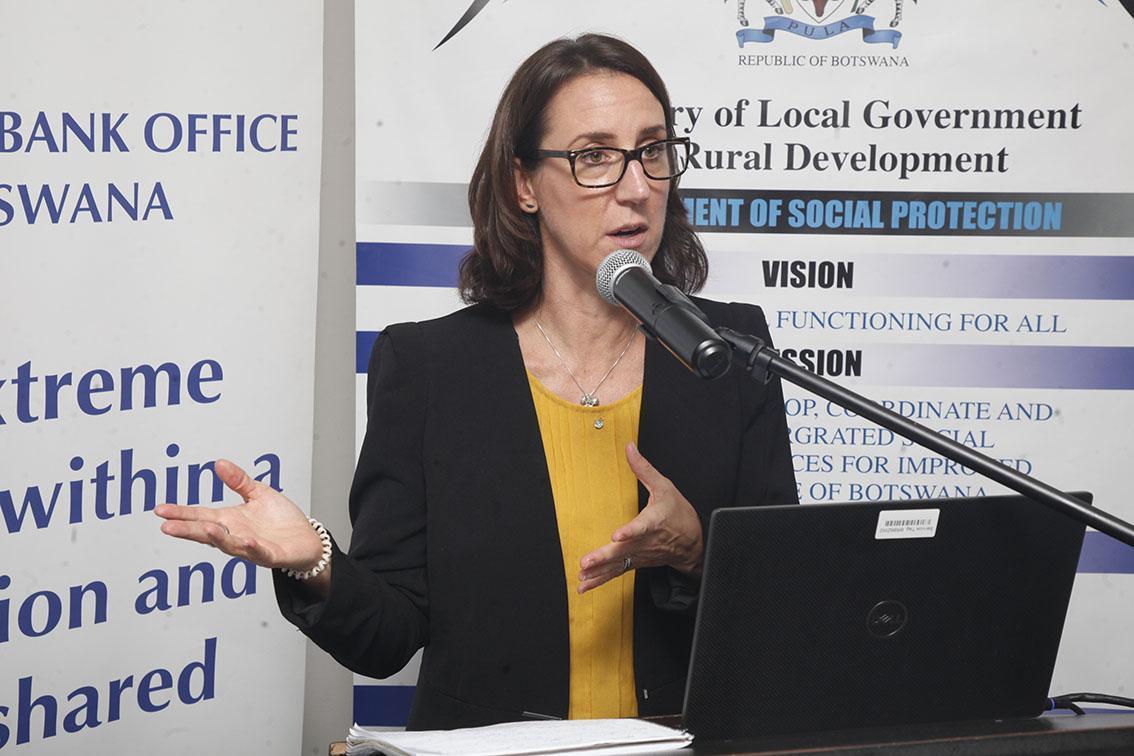Africa-Press – Botswana. Social protection programmes have a significant impact on poverty and inequality reduction in Botswana, World Bank Senior Economist, Ms Victoria Monchuk has said.
Presenting the review of social protection programs and systems in Botswana, she said social protection programmes had an average of eight per cent reduction on poverty head count. She said Old Age Pension continued to yield the highest contribution to the fight against poverty followed by school feeding program while destitute persons programme and student allowances had modest impacts on poverty and inequality reduction.
“The poverty rate of 16 per cent would go up to 24 per cent and the poverty gap would increase from 4.6 per cent to 9.5 per cent if social transfers were eliminated,” Ms Monchuk said.
She stated that in the absence of social assistance programs, poverty head count would increase from 16 per cent to 22.8 per cent while the poverty gap would go up to 4.6 per cent to 7.9 per cent.
Ms Monchuk said Botswana spent about 3.6 percent of its GDP on social assistance, with a large number of the population benefiting from the programme adding that nearly 56 per cent of the total population and 79 per cent of the poor benefit from at least one social protection programme.
Social assistance beneficiaries were largely concentrated in younger age groups, a move which she said was not surprising owing to the nature of the social protection programmes that included scholarships, school feeding, orphan care and the country’s demographics where children below 0-14 years make up nearly one-third of the population.
Although the social protection system achieved important objectives in terms of reductions in poverty, Ms Monchuk nonetheless said there was room for further improvement.
“There are multiple opportunities for improved efficiencies and efficacy of the system, including implementation of the single social registry, improving targeting and data management as well as reallocating spending to programmes with greatest impact on reducing poverty,” she said.
She indicated that it was pleasing to note that government had embarked on an agenda to strengthen the social assistance system, highlighting that the reform should however be broadened and deepened with the view to maximize efficiency, effectiveness and crisis responsiveness.
Ms Monchuk said there was significant room to improve the delivery of social protection in Botswana since the country had an amalgam of social protection programs that operated with little or no coordination.
She also said there was no clear focus on helping social assistance beneficiaries to transition to jobs and sustainable livelihoods and to promote human capital accumulation of beneficiaries through linking them to services.
“Many beneficiaries remain as such for years and government has expressed concern that beneficiaries have become dependent on social protection benefits, thus linkages between social assistance beneficiaries and labour market programs are ad-hoc and need strengthening,” she said.
Ms Monchuk said Botswana should advance its reform agenda and modernize its social protection delivery systems.
Given the small budget towards empowerment of destitute persons, she pleaded with government to increase budgeting for destitute persons thorough weeding out wealthiest beneficiaries of the tertiary scholarship programme and channel the funds towards destitute empowerment programmes to improve efficiency of the social assistance system in Botswana.
For More News And Analysis About Botswana Follow Africa-Press






